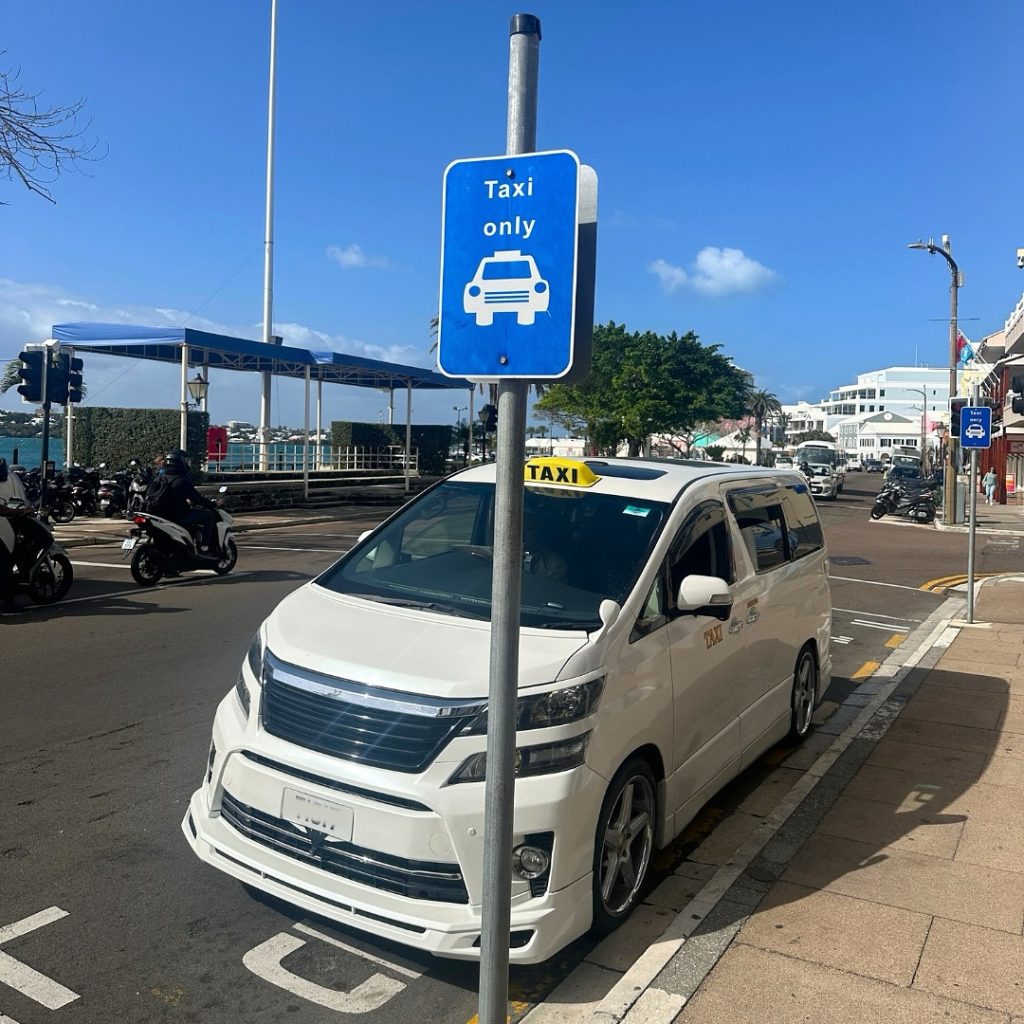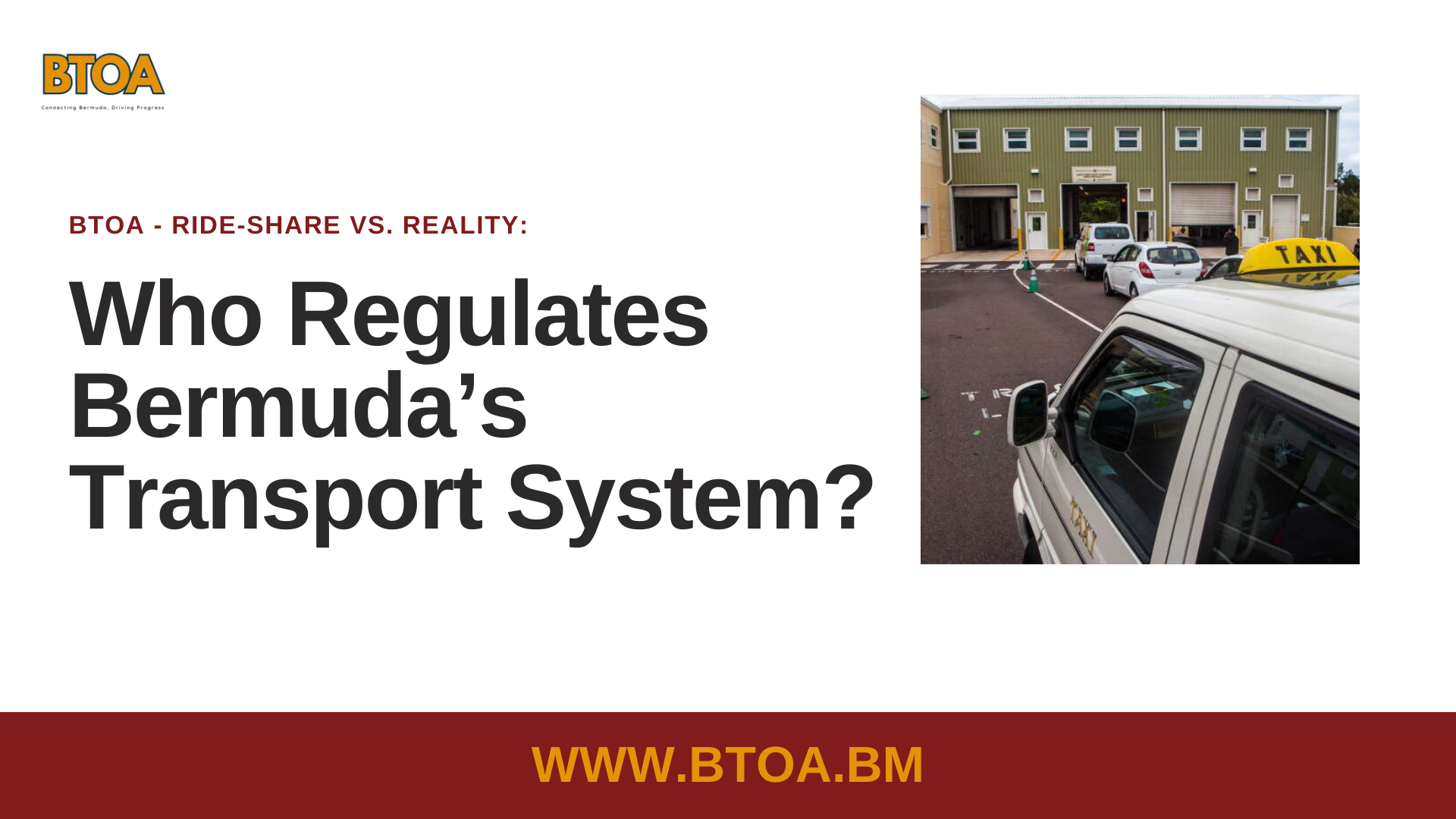Bermuda’s transport industry is more than just a way to get from point A to point B; it’s a living piece of our island’s social and economic fabric. This series by the Bermuda Taxi Owners and Operators Association (BTOA) is designed to educate and engage the public about what our industry is, how it began, and where it’s headed. To understand the issues we face today, we first need to understand how the industry operates and what role the government, regulators, and the wider community have played over the decades

Bermuda’s Taxi Industry
Series 1: The Story Behind the Wheel By BTOA
The Roots of the Industry: From Carriages to Cabs
Bermuda’s journey in public transport began in the 1930s with the railway, the 1940s omnibus, and then in the 1950s it was taxis, a pivotal era when the island transitioned from horse-drawn buggies to motor vehicles. The move to motor taxis reflected global trends in modernization, but in Bermuda, this shift also paralleled deep-rooted social change.
The early taxi industry, like many sectors at the time, was initially segregated and predominantly white-owned. Over time, however, it became a Black-dominated industry, with many Bermudian families building generational wealth and legacy through taxi ownership. This transition helped shape not just the industry but Bermuda’s evolving identity.
Many of today’s taxi operators, hospitality workers, teachers, civil servants, entrepreneurs, business executives, and politicians of the island are the children and grandchildren of those original pioneers. These families not only kept the island moving but were foundational to other emerging industries, such as guest houses and traditional bed-and-breakfast accommodations, which sprang up as visitors returned and formed friendships with their drivers.

More Than Transport: Building Bermuda’s Culture
The rise of the taxi industry also meant a boost for Bermuda’s nightlife and hospitality. In its heyday, especially through the 1960s to 1990s, taxis lined up outside hotels, clubs, restaurants, and bars, waiting to ferry visitors and locals alike to their next stop. Our operators were more than drivers; they were ambassadors of the island, guides to secret beaches, storytellers of Bermuda’s folklore, and often the first and last point of contact for visitors.
Taxis enabled the entertainment industry to flourish. With ease of transport, venues could host events day and night, and Bermuda became a hub of both local and international talent. The seamless movement of people supported the entire tourism ecosystem.
The Early 2000s: A Global Shift, A Local Struggle
By the early 2000s, however, change was on the horizon. The world was becoming more digital, and consumer behavior was shifting. People wanted instant access, online payments, and mobile convenience. This global wave of technology presented opportunities, but also challenges for industries slow to adapt.
In Bermuda, tourism numbers began to decline, and the international business sector that once drove high-volume transport started to plateau. Then came the global recession (2007–2010), an economic crisis that affected spending, trade, and travel across the globe. Fewer visitors, tighter wallets, and less commercial activity all meant less work for taxi operators.
During this period, Transport Ministers changed as well:
- The Hon. Ewart Brown JP, MP (PLP 1998-2010)
- The Hon. Terry Lister JP, MP (PLP 2010-211)
- The Hon. Derrick Burgess JP, MP (PLP 2011-212)
- The Hon. Walter Roban JP, MP (PLP 7 Jun 2012 – Dec 2012)
They held portfolios, but little meaningful reform was made to modernize the taxi industry.
Many taxi owners simply couldn’t weather the storm. Some sold their medallions or vehicles, and others parked up indefinitely. With regulators largely silent or inactive, the industry drifted.

2012–2016: The Technology Divide
The next major shift came between 2012 and 2016, when technology in transportation exploded worldwide. Ride-hailing apps like Uber and Lyft were transforming global cities. Tourists and locals alike became accustomed to tracking rides, rating drivers, and paying through mobile apps.
Bermuda was again slow to respond. While a few local dispatch services experimented with technology, many operators hesitated to adopt new systems, due in part to regulatory uncertainty and lack of leadership from the Transport Control Department (TCD) and the Public Service Vehicle Licensing Board (PSVLB). These agencies are tasked with enforcing transport laws, vetting equipment, software, and applicants, monitoring service standards, and ensuring compliance.
Unfortunately, many in the industry felt that TCD and PSVLB failed to deliver on their mandates. Despite repeated calls for better data collection, monitoring, enforcement, and service regulation, operators were left to fend for themselves. Without strong oversight or incentives, modernisation stalled.
Who’s Really in Control?
One of the key questions often asked is: If the industry is struggling, who is accountable? The answer lies within the structure of transport regulation.
By law, the TCD and PSVLB are responsible for:
- Issuing licenses and vetting applications
- Enforcing infractions and service requirements
- Monitoring dispatch companies and their platforms
- Ensuring drivers follow the law under the Motor Taxi Act, the Dispatching Act, and the Motor Traffic Act
These are not optional duties. They are part of the legal framework established to protect both the public and the industry.
Yet, year after year, taxi operators have called for enforcement and modernization, with little to no action from policymakers. Meanwhile, successive Transport Ministers have failed to implement systemic change. In recent years, these ministers include:
- The Late Hon. Shawn Crockwell (UBP/Independent, OBA 2012–2016) (d. 06/2017)
- The Hon. Dr. Grant Gibbons, JP, MP(OBA 2016 Acting*)
- The Hon. Michael Fahy, JP, MP (OBA 2016-217)
- The Hon. Zane DeSilva JP, MP (PLP, 2018-2020)
- The Hon. Neville Tyrrell JP, MP (PLP Jul 2020 – Oct 2020)
- The Hon. Lawrence Scott JP, MP (PLP2020-2022),
- The Hon. Wayne Furbert JP, MP (PLP 2022-2024),
- and most recently, The Hon Min. Owen Darrell JP, MP (PLP, 2025–Present)
Each individual has acknowledged the challenges at hand; however, only three have genuinely addressed significant transport issues. For instance, Michael Fahy highlighted the illegal operations of Hitch in 2016, while Lawrence Scott collaborated with BTOA from 2020 to 2022 to explore experimental solutions. Although the new Minister, the Honorable Owen Darrell, has engaged in collaborative discussions and improved police presence at attractions across the island, critical issues remain unresolved.

How the Industry Works: A Primer for the Public
Let’s answer a basic but important question: How do you book a taxi in Bermuda?
Common Booking Methods:
- Street Hail – Flagging a cab on the roadside
- Taxi Stand – Picking up from designated locations (like airports, front street, or hotels)
- Calling a Dispatch Company (Island Taxi and BTA)
- Using a Company Website
- Ride-Hailing Apps (Hitch, Ride.bm, BTOA Connect)
- Chat Groups (WhatsApp, Telegram)
Types of Bookings:
- On-Demand / Real-Time – Immediate transport
- Advanced Booking – Same-day but scheduled
- Pre-Arranged Booking – Made 24+ hours in advance
- Private Hire / Tours – Hourly or customized arrangements
Who’s Really in Control?
In most cases, the process involves dispatching a driver using a system (app or phone). However, if something goes wrong, such as no-shows, delays, or refusals, accountability is difficult. Companies using modern apps can track drivers via GPS, but traditional dispatch services often can’t.
This is where enforcement matters. By law:
- Drivers are required to accept passengers at places of hire
- All taxis must be available for public use at least 16 hours a day
- Licensed operators must follow the fare rates and booking rules
When these rules are ignored, and complaints arise, the question becomes: Who enforces them? That’s the job of TCD and the PSVLB.
What Comes Next?
This article is the first in a series aiming to pull back the curtain on Bermuda’s taxi and transport industry. In the next installment, we’ll break down the specific laws that govern this sector, and why enforcement is essential to progress. We’ll also dig deeper into the relationships between policymakers, private companies, and regulators, and how those relationships may be affecting transparency and fairness in the transport sector.
The BTOA remains committed to improving this industry. But real change starts with public understanding. We invite you to follow this series, ask questions, and help us push for a transport system that works for everyone.
Stay tuned for Series 2: Who’s Driving the Law?




